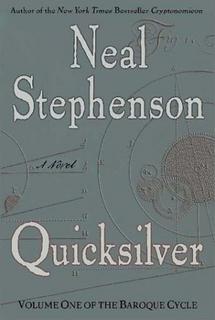Der Mistfink, der Leseratte

Holding on for dear life to the coattails of Herr Staubsauger (proud publisher of exactly 75% of all StuSie posts), I thought I would enter the critiques and reviews market, but not in the realm of moving pictures; rather, I derive great pleasure (and, of course, heaping spoonfuls of disgust) in the world of the written word.
My current situation as an employee of the esteemed Austrian Department of Education has afforded me, shall we say, a more than average amount of time to devote to devouring books like a super-obese Wisconsinite gorging themself with a basket of deep-fried cheese curds. And devour books, I have, dispatching Hesse, Hemingway, and Dostoyevsky while still having ample time to master the idiosyncracies of snowboarding in fresh powder.
That said, about one month ago I embarked on my most recent literary odyssey, "Quicksilver" by Neal Stephenson. And an odyssey it is: at 900 pages and approximately 5 kilograms, this historical novel not only substitutes as a paper weight, it also doubles as a blunt object, to be used on insolent students and charging dairy cattle. But that's not all: this hulk of a book is only the first of three episodes of a much larger epic called the Baroque Cycle, which in total exceeds 2600 pages. At first, this fact made me think two things (in no particular order): 1. Neal Stephenson is a man with nothing better to do than sit at his word processor of choice and expel horrendous amounts words more or less at random from his Metamucified asshole, and 2. By god, I've got to read this trilogy, if not so that I can say I read a series that has damnnear as many pages as Proust's seven-volume "In Search of Lost Time", than to somehow occupy the 153 hours a week that I'm not working.
Well, exactly 812 pages into the 900 page 'Quicksilver', I can honestly say that Stephenson has managed to create a historical novel that takes place before the 19th century that isn't as boring as Angela Merkel. In fact, Herr Stephenson has taken legendary characters like Isaac Newton, Gottfried Leibniz, The Sun King Louis XIV, Robert Hooke, Christian Huygens, and William of Orange and given them new life and personality. In following Stephenson's fictional characters Daniel Waterhouse, Jack Shaftoe and Countess Eliza we participate first hand in events like the first Royal Society of England meetings, the siege of Vienna by the Turkish horde, the death of Charles II, and the invasion of England by William of Orange. In addition to all of this, Stephenson is deft enough to stitch in his own fictional events to spice up Europe's 17th century (as if the Plague, the 30 Years War, the Glorious Revolution, and knickerloads of imperial intrigue weren't enough).
Tersely expressed, 'Quicksilver' is a bombardment of factual accounts and fictional adventure whereby the reader is kept on his toes while also learning about one of the most complex historical periods in world history. Indeed, during this time Europe first began exploring the world of investment, imperialism, drastic scientific developments, and generally improving their ability to exploit the living hell out of anyone living on a continent beginning with the letter 'a'.
Languagewise, the book sways between old-school English and modern prose, which sometimes seems a bit strange and annoying, but in general is a good way of giving the reader the feel that he is in a geniunely old setting without inciting the boredom of, say, Charles Dickens or Thomas Hobbes. So in the case that any of you find yourselves in the situation that you barely have to do any work at all, and the snow isn't yet ideal for skiing or snowboarding, and that in general you have nothing whatsoever better to do, than goddammit, read 'Quicksilver' and get smarter...and stuff.


0 Comments:
Kommentar veröffentlichen
<< Home